Quick Tips for Removing Hard Water Stains from Marble Surfaces without Damage at Home
Hard water stains can mess up the beauty that marble surfaces add to ours home, making it difficult to preserve their appearance. Further, the application of an inappropriate marble cleaning solutions at home could result in major damage or create conditions for more severe and complicated downstream problems, like penetrative staining or grout staining. […]


Hard water stains can mess up the beauty that marble surfaces add to ours home, making it difficult to preserve their appearance.
Further, the application of an inappropriate marble cleaning solutions at home could result in major damage or create conditions for more severe and complicated downstream problems, like penetrative staining or grout staining.
So, let’s see a few good things that you can try at your home to help clean hard water stains off your marble surfaces.
What Exactly Are Hard Water and Hard Water Stains and Why Should You Approach them With Care ?
Hard water stains on marble surfaces are the result of the precipitation of CaCO3.
Hard water contains high levels of minerals such as Calcium Carbonate (CaCO3). These naturally occurring impurities are left behind when hard water evaporates, forming a hard white powder deposit on the surface.
This “crud” or precipitate collects around faucets and other water sources and can be difficult to remove once deposited.
Many homeowners attempt marble cleaning at home using acidic products or household remedies, but these methods often do more harm than good.
While they may provide temporary stain removal, they will also damage the surface. They can remove the seal from your grout, setting you up for a different staining issue in the future, i.e., grout staining.
For years, acidic substances like vinegar, phosphoric acid, or harsh masonry cleaners have been used to remove these precipitated calcium carbonate deposits or stains.
They do remove the CaCO3 precipitate. The issue is that your marble is also made of the same material, i.e., CaCO3, and this method cannot discern between the two.
As you attempt marble cleaning to remove the surface deposit, you are also micro-pitting the marble, gradually losing shine, creating a new visual issue, and removing any seal on the marble, which is indeed a major and complex issue to tackle.
However, even if the surface is not sensitive to acids, such as granite, porcelain, or ceramic tile, using an acidic “cleaner” or “solution” will strip seals from the surface (granite) and surrounding grout, leading to eventual grout staining.
The biggest issue here is that it is sneaky, as the initial result looks good. Still, the downside appears over time as a direct result of our ongoing cleaning, which solubilizes dirt and oil that can now penetrate the unsealed surface to settle when the water evaporates, creating a dark stained grout.
This sounds like a complex problem to deal with. But MARBLELIFE can fix it if you recognize this situation as already existing.
How Can MARBLELIFE be a Solution?
MARBLELIFE, a professional hard surface restoration company, offers specialized solutions to remove hard water stains from marble, travertine, limestone, and grout surfaces that will differ from removing the stains from other less sensitive surfaces.
MARBLELIFE’s understanding and restorative expertise allow greater flexibility to create solutions tailored to the stained surface.
MARBLELIFE can employ restoration, re-polishing, and resealing techniques to eliminate water stains efficiently, ensuring the surface is undamaged, and retain its appropriate sealing protections when complete.
Additionally, MARBLELIFE can provide valuable guidance on preventing or rectifying similar situations in the future, allowing you to eliminate the cause, without which this issue will re-occur.
Many do-it-yourself (DIY) remedies often result in additional restoration work for MARBLELIFE in the long term. This translates to short-term success but a downstream expense to you. It is recommended to take professional assistance for effective, efficient, and long-lasting results.
We understand the frustration hard water stains create and want to help you avoid using harmful products that can damage your marble or mark your otherwise clean surface appearance over time.
This blog post provides simple tricks for removing hard water stains from marble surfaces without damaging them.
By following our tips, you can effectively remove water stains without causing any harm to the surface or grout and keep your marble surfaces looking beautiful for years to come.
Tips for Removing Hard Water Stains from Marble Surfaces without Damage
While many standard household cleaners are available for removing hard water stains from marble, travertine, and limestone, it’s important to be cautious when using them.
Marble and other natural stones are surprisingly susceptible to damage from many cleaning products and hard water stain solutions.
Using the wrong one can result in unsightly etches that are even harder to remove than the original water stain or open the surface to staining by other products.
Water stains are typically on the surface; once a seal is removed, it opens the surface up to be penetrated by stains that are more difficult to remove from within the stone.
It’s important to use surface-safe and effective solutions specifically designed for removing water stains to avoid this problem and keep your marble surfaces looking their best.
1. Using Dish Soap to Clean Hard Water Stains
A mixture of mild dish soap and warm water can work wonders for light water stains on marble surfaces.
- Mix a few drops of dish soap with warm water in a spray bottle and gently mix it.
- Spray the solution onto the water stain, dampen a cloth or paper towel, and apply it to the affected area.
- Using a circular motion, gently wipe the stain until it disappears.
- Use a soft-bristled brush for a little extra cleaning power if needed.
- Rinse the area with fresh water and dry it immediately to prevent any soap scum or residue from building up, which could lead to further water spots.
If you have hard water and want to keep your marble surface looking its best, consider mixing distilled water with dish soap in a spray bottle for regular cleaning.
Distilled water is a better option than hard water because it does not contain CaCo3, which can cause deposits to form and harden over time.
While distilled water can help prevent this issue, it is not recommended to wait until the build-up has hardened before attempting to remove it.
2. Using Liquid Stone Cleaner to Clean Off Hard Water Stains
Liquid stone cleaners formulated for marble cleaning surfaces are surface-safe and can effectively remove precipitated hard water stains without damaging the marble.
These cleaners are formulated with distilled or purified water and, as such, are more effective in dissolving and resolubilizing precipitate than hard water that is already saturated with calcium.
These solutions cannot dissolve the precipitate due to their non-acidic nature.
- Apply the cleaner to the water stain, allowing it to sit for a few minutes.
- Gently wipe away the cleaner using a soft cloth or sponge.
- Rinse the area with water and dry thoroughly.
This method is better than using an acidic solution, as one can remove this material without damaging seals, but it will take some elbow grease.
The benefit is that they will not damage the surface, but they are neither the fastest route nor do they address the situation that created it in the first place.
3. Soft Cloth or Sponge for Cleaning Off Hard Water Stains
Using a soft cloth or sponge is a gentle and safe method for removing hard water stains from marble surfaces.
- Dampen the cloth or sponge with a suitable cleaning solution or liquid stone cleaner, and gently wipe the stained area in a circular motion. The soft and non-abrasive texture of the cloth or sponge ensures that the marble surface won’t be scratched or damaged.
- After removing the stain, rinse the cloth or sponge and wipe away any residue.
- Finally, rinse the area with water and dry it thoroughly to prevent water spots. Using a sponge or soft cloth, you can effectively clean water stains from marble surfaces while preserving their beauty and integrity.
If there are only light deposits, this method will be effective. But if the hard water stains have built up over time, using a sponge may result in it getting damaged, which is a clear indication that you need to try a different approach.
It’s important to prevent the water from evaporating from the surface to remove hard water stains successfully. Wipe up any spills before they evaporate and leave behind stubborn stains.
4. Light Scrubbing with a Non-Abrasive Brush
In cases where gentle scrubbing is needed, a non-abrasive brush with soft bristles can remove water stains from marble surfaces.
- Dip the brush in a mild cleaning solution or liquid stone cleaner and lightly scrub the stained area in a circular motion.
- Apply gentle pressure and periodically rinse the brush to prevent dirt or debris from accumulating.
- After removing the stain, rinse the area with water and dry it thoroughly.
- Using a non-abrasive brush, you can safely and effectively remove water stains from marble surfaces without causing any damage.
5. Microfiber Cloth for Drying
The source of the hard water stains is the hard water itself. To prevent this problem from returning after cleaning your marble surfaces, one solution is to invest in a water softener.
While it can be costly, with prices starting at $5000, you can also prevent hard water stains by maintaining good cleaning habits.
For example, ensure water doesn’t stay on your surface when wet, as this can cause the minerals to deposit through evaporation.
Use a microfiber cloth which provides greater surface area absorption than regular cloths. With these tips, you can keep your marble surfaces looking clean and shiny.
How to Prevent Water Stains and Etch Marks?
Water stains on marble surfaces can be a frustrating problem to deal with, but taking preventative measures can help avoid them altogether. Here are some tips for preventing water stains in the first place:
- Use coasters: Place coasters under glasses, cups, and bottles to prevent water rings from forming on your marble surface.
- Wipe up spills immediately: If you spill any liquids on your marble surface, clean them up immediately with a soft cloth to prevent any water from seeping into the pores of the marble and causing stains.
- Use a tray or mat: Place a tray or mat under potted plants or water-holding containers to prevent it from pooling on the marble surface.
- Say no to acidic cleaners: Do not use any acidic cleaners or other remedies, as these can damage the surface or remove seals designed to protect the surface from being stained.
- Say no to steel wool: When removing water stains from marble, avoid using anything too abrasive, as this can create scratches that are even harder to fix than the original stain. While a soft-bristled brush or plastic scraper can effectively remove light build-up, it’s essential to avoid using metal tools like putty knives or screwdrivers, which can scratch the surface and will need a professional to polish out.
How Not to Remove Water Stains from Marble Surfaces?
When cleaning marble surfaces, avoid acidic substances to ensure their long-term integrity, appearance, and feel.
Acidic substances can irreparably damage both the surface and grout. Hard water stains caused by precipitated CaCO3 are commonly addressed using traditional methods involving acids such as white vinegar, lemon juice, masonry acids, or acidic cleaners marketed as hard water stain removers.
However, these acids dissolve marble, travertine, and limestone, all composed of calcium carbonate. Additionally, they remove the seal from grout and granite surfaces, posing a risk of more significant staining in the future.
While these methods may provide short-term solutions, they can lead to long-term damage requiring professional re-polishing and sealing. To avoid unnecessary complications, steer clear of these popular cleaners and preserve your marble surfaces.
If you believe your surface may already be damaged due to such methods, it is advisable to seek assistance from a professional such as MARBLELIFE. At MARBLELIFE, our experts can provide expert guidance and help address any potential issues.
MARBLELIFE, a professional restoration company, offers a range of effective techniques and cleaning products to maintain your marble surfaces. Unlike DIY remedies, which often complicate the process, MARBLELIFE’s experienced team can operate more efficiently and ensure successful results.
With our expertise, we can self-correct the surface once the cleaning is complete. Our skilled cleaners and tile experts are adept at restoring, re-polishing, and resealing surfaces as necessary.
Furthermore, we provide valuable guidance on how to prevent or address similar situations in the future, helping you maintain the pristine condition of your marble surfaces.
Conclusion
It’s important to use the appropriate methods and products when it comes to cleaning and maintaining high gloss finishes on marble surfaces.
Acidic or strong cleaning solutions can cause micro-abrasions on the surface, leading to dull patches. To prevent this, use a cleaning solution designed specifically for marble surfaces, be sure to wipe up spills immediately, and use coasters to prevent water stains in the first place.
With these tips, you can keep your marble surfaces looking clean and shiny for many more years to come.


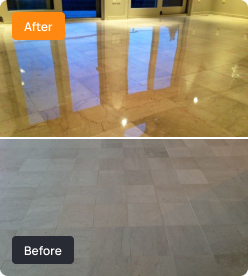
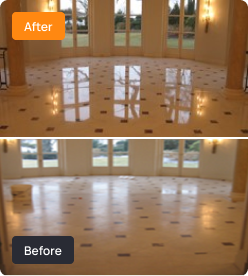
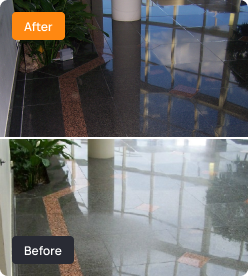
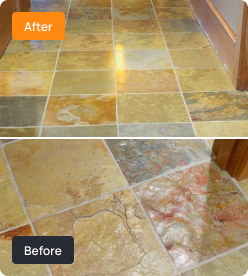
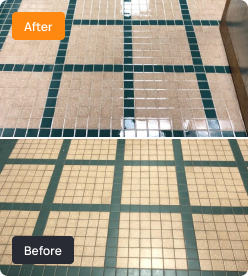
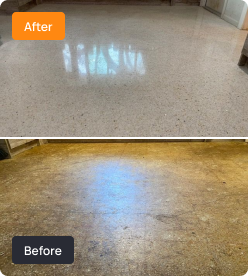
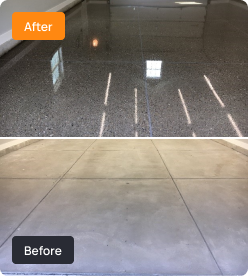
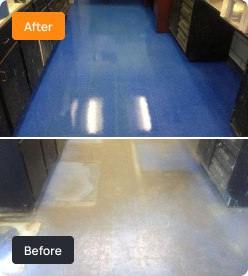
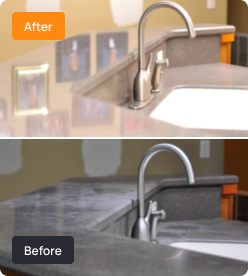
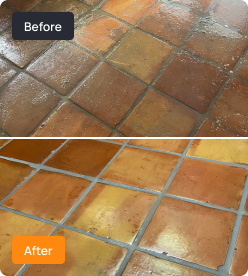
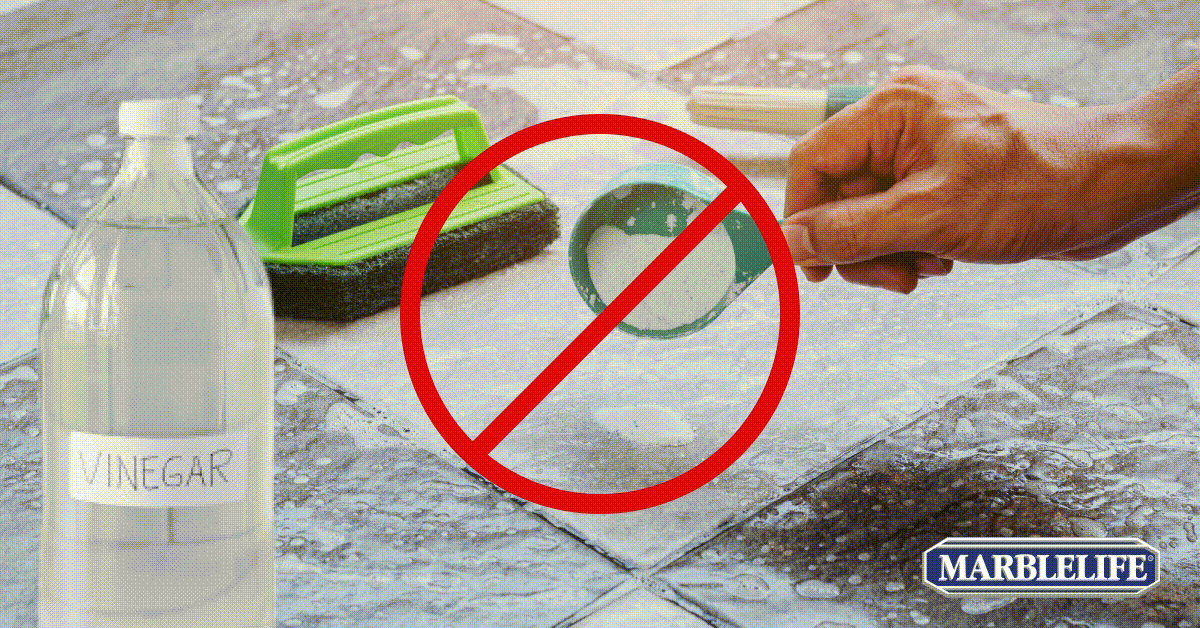
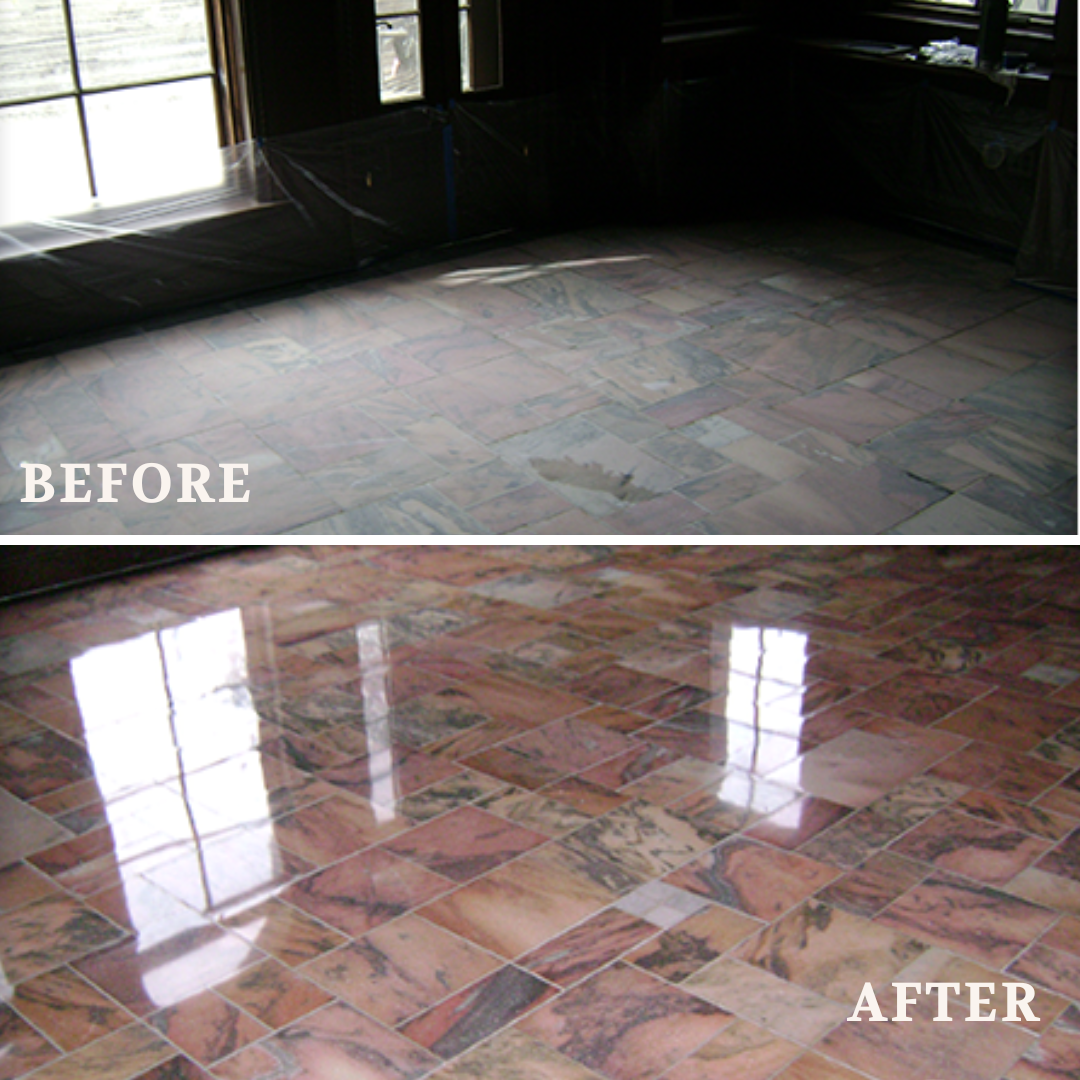 Restored Floor After Being Repeatedly Cleaned with Vinegar
Restored Floor After Being Repeatedly Cleaned with Vinegar
